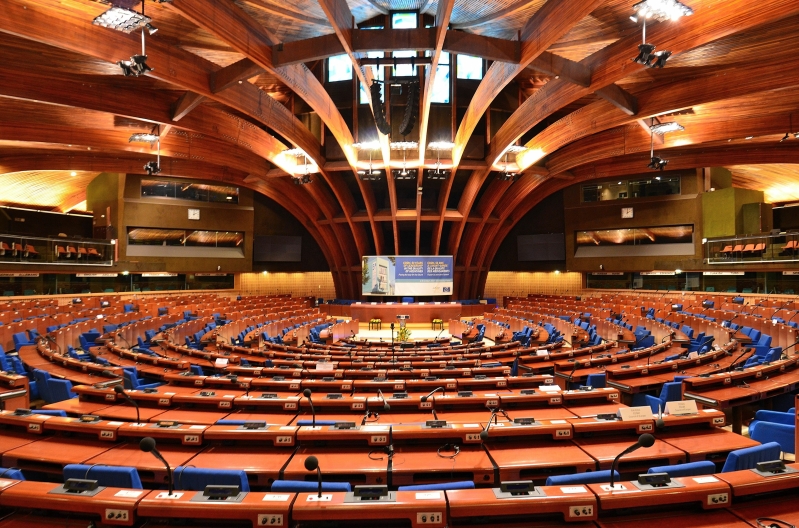
A lack of “political support” led the Parliamentary Assembly of the Council of Europe (PACE) to vote (Oct. 3) in favor of returning a controversial resolution to decriminalize prostitution as a normalized occupation of “sex work” back to the Committee on Equality and Non-Discrimination. The move has been hailed as a “milestone victory” by the The European Centre for Law and Justice (ECLJ).
Before the vote, the ECLJ expressed public concern about the report and motion for the resolution on prostitution entitled: “Protecting the human rights and improving the lives of sex workers and victims of sexual exploitation.”
At the assembly meeting, Mariia Mezentseva-Fedorenko, committee chairperson, reportedly asked for the papers to be returned for “discussions, work and deliberations.”
Support for the first iteration of the document looked to reinforce a view that prostitutes make a living of their own free will – despite data clearly showing the majority are coerced migrants, according to the ECLJ.
This view had also been supported despite fierce opposition against the legalization of prostitution by Ms. Reem Alsalem, the United Nations (U.N.) Special Rapporteur on Violence Against Women And Girls, as reported by Christian Daily International.
Alsalem told the United Nations Human Rights Council’s 56th session in June/July that “Prostitution is a system of exploitation and an aggregated form of male violence against women and girls that intersects with other forms of structural discrimination.”
She also slammed the idea of state authorities legalizing prostitution, saying that States made profits from prostituted women in full legalized systems. In Switzerland, for example, an annual revenue of 3.2 billion CHF ($3.5 billion USD) had been generated by the commercial sex industry.
“States benefit from the prostitution of women through personal income tax imposed on them, the corporate taxing and licensing fees required on brothels and/or cyber enabled businesses, in essence becoming a pimp State,” said Alsalem.
Despite these comprehensive known concerns, the ECLJ, a Christian-based non governmental organization (NGO), believed that the Parliamentary Assembly of the Council of Europe was being pressurized by lobbyists to legalize prostitution, regardless of the clear links with human trafficking, as evidenced by Alsalem.
“Behind the laudable objective of defending the rights of people in prostitution, this proposal in fact conceals the legalization of their exploitation and the regulation of the violence of prostitution,” claimed the ECLJ, in a public statement before the Oct. 3 vote.
“It is therefore important that the members of the Parliamentary Assembly of the Council of Europe shoulder their responsibilities and firmly oppose the adoption of this one-sided Resolution, which is out of touch with the real plight of thousands of women and men in Europe.”
If the proposal had been approved in its current form, all criminal sanctions would be abolished against clients and pimps, who would effectively become employers.
The ECLJ believed the current influential text for the assembly report had been compromised, setting out the terms of the issue by mainly promoting the normalization of prostitution as sex work.
The NGO pointed out the different approach, a “flagrant contradiction,” of the current document to the initial text for the debate entitled, “The reintegration of persons trapped in prostitution and human trafficking survivors.”
“Over and above a change of title, it is the protection of people in prostitution that is turned upside down: from a ‘trap’, prostitution is transformed into ‘work’, which should be normalized in order, supposedly, to improve the lives of its victims,” stated the ECLJ.
The debate on abolitionism against decriminalization of sex work, as outlined in the current report, could have been constructive but contains an “all-out criticism of the abolitionist vision,” according to the ECLJ, “which is presented as prejudicial, while the decriminalization of prostitution is applauded.”
Furthermore, international source texts utilized to build the argument in favor of decriminalizing sex work, were presented as “exemplary” in the report for the debate, the ECLJ stated, without a balance because advocates for the abolition of prostitution “do not seem to have been consulted.”
Alsalem’s report for the U.N. Human Rights Council “is not even mentioned” in the text informing European parliamentarians for the debate. This compares to comments contained in the report by Tlaleng Mofokeng, UN Special Rapporteur on the right to health, advocating the total decriminalization of prostitution, added the ECLJ.
“The bias in favor of total decriminalization of prostitution is therefore obvious, even though it is a direct affront to human dignity,” stated the ECLJ.
Looking at the detail of the current committee report, the ECLJ highlighted other concerns in regards to international law. The proposal distinguished between forced prostitution and sex work, advocating for the normalization of the latter activity.
“However, this vision of prostitution as acceptable is purely ideological and inoperative in international law,” stated the ECLJ. “It is a denial of reality because it implies admitting the existence of legitimate prostitution: prostitution that is fully chosen or freely consented to, which is extremely rare. It has been established that prostitution is largely exploited by traffickers.”
The NGO referred to data showing a large number of known prostitutes in the European Union who have been coerced into the activity. These figures came from the European Parliament itself in a resolution dated Sept. 14 last year (2023), reporting 70 percent of the 30,000 prostitutes in the Netherlands being either manipulated into the activity by a third party, such as a “loverboy” or by straightforward violence.
For the European Union as a whole, 70 percent of prostitutes on the continent are migrant women and 51 percent of human trafficking victims in the EU are trafficked specifically for sex exploitation, the ECLJ stated. A further reference was made to the Organization for Security and Co-operation in Europe (OSCE) stating that USD 100 billion per year is generated by men paying trafficked women for sex.
Even if trafficking is not involved in prostitution, the ECLJ pointed to the vulnerability of prostitutes selling sex to stave off poverty.
“In fact, in cases that do not involve trafficking in human beings, a person who prostitutes is at the very least pushed or forced into it by particular circumstances, such as poverty, but always because he or she is responding to the request of a third party. In any event, the law is clear on the question of consent: the consent of a victim of human trafficking to his or her own exploitation is irrelevant when it is obtained by the offer or acceptance of payments or benefits.”
In its statement, the ECLJ outlined a number of comments by the European Union and U.N., stating that the concept of prostitution violated human rights. For example, the Preamble to the United Nations Convention for the Suppression of the Traffic in Persons and of the Exploitation of the Prostitution of Others (1949) declares: “prostitution and the accompanying evil of the traffic in persons for the purpose of prostitution are incompatible with the dignity and worth of the human person and endanger the welfare of the individual, the family and the community.”
This statement, according to the ECLJ, is based on the Preamble of the Universal Declaration of Human Rights (1948), recognising “the inherent dignity and of the equal and inalienable rights of all members of the human family is the foundation of freedom, justice and peace in the world.”
“Whether or not it involves trafficking in human beings, prostitution by its very nature violates human dignity,” added the ECLJ. “From this point of view, it would be absurd for the PACE to adopt the present motion for a Resolution which calls on legislators ‘to ensure that sex workers may carry out their activity in dignified conditions.’
“Similarly, prostitution cannot be considered as ‘an important risk factor for violence against women’: it is in itself violence.”
The committee could be given another six months to revise the report and the ECLJ called for the time to be used to “modify the general thrust of the report and the motion for a resolution and to remove all factual untruths and legal approximations.”
“The ECLJ will not fail to follow the evolution of these texts: the protection of the dignity of people trapped in prostitution is at stake, as is the credibility of the PACE,” added the ECLJ.





